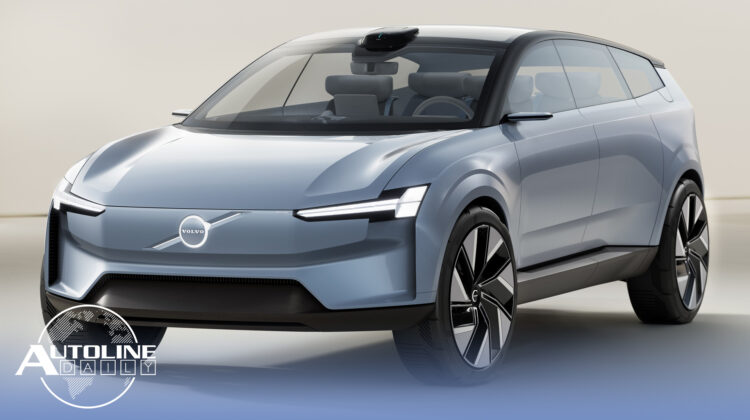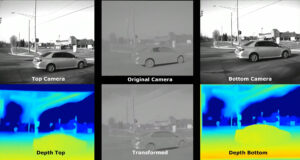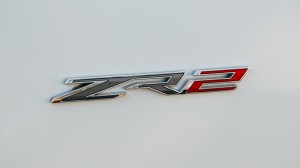
Listen to “AD #3113 – Analysts Can't Agree on Tesla's Valuation; Who's Best Handling the Chip Shortage?; Volvo to Offer Lidar Standard” on Spreaker.
Follow us on social media:
Runtime: 9:18
0:07 Analysts Can’t Agree on Tesla’s Valuation
1:01 Who’s Handling the Chip Shortage Best?
1:40 Porsche Tells Suppliers to Use Green Energy
3:12 Brake Coating Improves New Pad Performance
4:12 ZF Using AI to Speed Up ADAS Testing
5:03 Nissan Suing Supplier Over Starter Battery Issue
6:27 Chevy Adding ZR2 Trim to Silverado Lineup
6:58 Volvo Making Lidar Standard
Visit our sponsors to thank them for their support of Autoline Daily: Bridgestone, Intrepid Control Systems, Magna and Wacker.
This is Autoline Daily, the show dedicated to enthusiasts of the global automotive industry.
ANALYSTS CAN’T AGREE ON TESLA’S VALUATION
Talking about Tesla’s valuation always sparks a debate, and even the analysts can’t agree. The EV maker is by far and away the highest valued automaker at about $680 per share but one analyst at Roth Capital predicts that will drop to only $150 a share. He says Tesla has more competition, sales are slowing down in China and it will lose revenue as money from selling EV credits goes away. But other analysts say “Hogwash.” Piper Sandler predicts the stock will nearly double to $1,200 a share. And if Tesla is able to come out with fully self-driving cars, Ark Investment says shares will hit $3,000 by 2025. Tesla will report its second quarter sales any day now so we’re going to learn which analyst is on the right track.
WHO’S HANDLING THE CHIP SHORTAGE THE BEST?
Who’s handling the chip shortage the best? And who’s doing the worst? LMC automotive says that in North America, Ford was hit the hardest, losing over 350,000 units of production in the first half of the year. GM lost about 250,000 units and Stellantis lost about 200,000. But Toyota and Tesla have barely lost any production at all. In fact, they’re both running around 90% of plant capacity. The rule of thumb in the industry is that 80% of capacity utilization is the breakeven point for a plant. Anything over that is pure profit.
PORSCHE TELLS SUPPLIERS TO USE GREEN ENERGY
Porsche wants the whole company to be CO2 neutral by 2030. So it’s telling its suppliers they better commit to using certified green energy for making components, or else. It says any supplier that doesn’t agree to using renewable energy will not get any long term contracts. Right now suppliers account for about 20% of all of Porsche’s greenhouse gas emissions. Without making the switch to renewables that would jump to 40% due to the increase in EVs, which require more energy to manufacture than ICE vehicles.
BRAKE COATING IMPROVES NEW PAD PERFORMANCE
Did you know brand new brakes don’t operate at their maximum performance level right out of the box? They require a break-in procedure, sometimes called running or bedding them in. It’s a way of heating and cooling the brakes in a controlled way that transfers an even layer of brake pad material onto the brake rotor. This improves brake performance, but can take up to 500 miles to reach peak levels. Not doing it can result in poor performance, squeaks and pulsations. Now the supplier TRW, which is part of the ZF Group, is applying a new coating to all its brake pads that make them nearly as effective right out of the box as a set that’s already been fully bedded. Stopping distances of vehicles with newly installed brake pads with the COTEC coating are cut by up to 7 meters or nearly 23 feet compared to other premium brake pads that don’t have the coating.
ZF USING AI TO SPEED UP ADAS TESTING
And we’ve got more info from ZF. The auto industry is investing a fortune to develop ADAS or advanced driver assistance systems. Part of the cost involves a small army of test drivers and engineers who have to validate those systems to make sure they’re safe. So ZF is working with the Israeli startup Cognata to capture sensor data and analyze it with artificial intelligence to slash the time and cost to validate ADAS by 20%. It uses both real world and simulated testing data. They call it ADAS.ai and it can be used to validate systems from ZF or any other supplier. OEMs want ADAS development to be like crash testing, They want to validate it digitally before they build the first prototype.
NISSAN SUING SUPPLIER OVER BATTERY ISSUE
Nissan is suing Italian supplier FIAMM Energy Technology, accusing it of supplying 900,000 faulty starter batteries. The automaker says it received a number of warranty claims from Qashqai and Juke owners in Europe because they weren’t getting proper power. Nissan is seeking $145 million in damages. FIAMM says it provided batteries based on Nissan’s specification and blames the company’s battery management system for the issue. Nissan says when it switched to starter batteries made by Johnson Controls its warranty claims dropped from 43% to about 5%. But FIAMM says that’s because Nissan optimized its system for Johnson Controls batteries.
CHEVY ADDING ZR2 TRIM TO THE SILVERADO
Ford has the Raptor. Ram has the TRX. But up until now Chevy didn’t have an answer to those full-size performance off-road trucks. That changes as it announced it will come out with a ZR2 version of the Silverado. It only has this short little teaser video to show, but as you know the Colorado ZR2 features those cool spool valve shocks supplied by Canadian company Multimatic. We’re guessing the Silverado gets a similar setup. Chevy says we’ll learn more this fall.
VOLVO MAKING LIDAR STANDARD
Elon Musk said any car company that relies on lidar is doomed, but Volvo is going to put a lidar unit on the roof of every XC-90 when the next generation comes out. Luminar will supply the lidar, which can see up to 300 meters in front of a car and provide centimeter accuracy with objects that are near the vehicle. Volvo built its reputation on building the safest cars, and it says lidar will make its cars even safer. Here’s how Hakan Samuelson, the CEO of Volvo, justifies adding the cost of lidar.
“The value is to build the safest car possible using the technology that is available. A car with a lidar will be safer than a car with just cameras. And of course Volvo needs to really use all available technologies. So yes, I think we cannot afford not having lidar on the Volvos when the technology is ready.”
So far Volvo only officially announced it will put lidar on the XC-90, but Samuelson left little doubt it’s eventually going to go on every model as standard equipment.
“I assume this will work fantastically and it will give us safer cars. And of course if there is technology that is available that can save lives then it’s very difficult to see that as optional. It’s exactly as somebody said, the airbags and seatbelts are not optional. If they are proven to be safer we will have it on our new generation (of cars).”
The cost of lidar is coming down fast. Those of you that caught the Autoline After Hours we did with Mircea Gradu from Velodyne will remember he said they can now put four lidar units on a car for less than $500.
Speaking of After Hours we’re going to take a deep dive into the new Ford Maverick pickup this afternoon. If Ford plays its cards right that truck has the opportunity to become a cult classic. We have Trevor Scott, the marketing manager, and Chris Mazur, the chief program engineer, coming on the show and we’re already getting questions from viewers about things they’d like to learn about the truck. If you’ve got a question, post it in the comments section, send a tweet to @Autoline, or send an email to viewermail@autoline.tv.
Then join John and Gary as they go live at 3 pm eastern time.
But that’s a wrap for today. Thanks for watching.
Thanks to our partner for embedding Autoline Daily on its website: WardsAuto.com
Seamus and Sean McElroy cover the latest news in the automotive industry for Autoline Daily.









